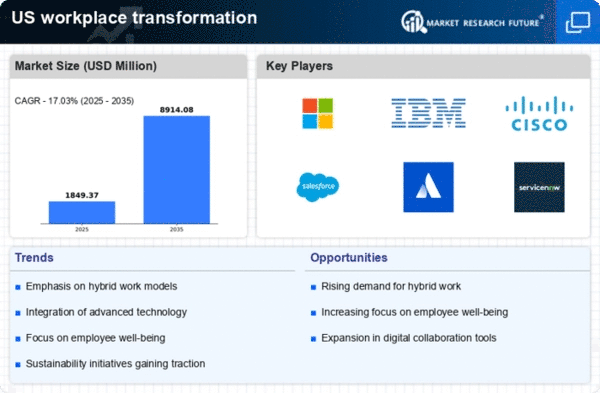Rise of Remote Work
The increasing prevalence of remote work arrangements is a pivotal driver in the workplace transformation market. Organizations are adapting their physical spaces to accommodate hybrid work models, which blend in-office and remote work. This shift necessitates the redesign of office layouts, enhancing collaboration areas while reducing traditional desk spaces. According to recent data, approximately 30% of the workforce in the US is expected to work remotely at least part-time by 2025. This trend compels companies to invest in technology and infrastructure that support remote collaboration, thereby influencing the workplace transformation market. As businesses seek to create environments that foster productivity and engagement, the demand for innovative workplace solutions continues to grow.
Focus on Sustainability
Sustainability has emerged as a critical driver in the workplace transformation market. Organizations are increasingly prioritizing eco-friendly practices in their operations, leading to the redesign of workspaces that minimize environmental impact. This includes the use of sustainable materials, energy-efficient systems, and waste reduction strategies. According to recent statistics, around 70% of US companies are implementing sustainability initiatives in their workplace strategies. This trend not only aligns with corporate social responsibility goals but also appeals to environmentally conscious employees. As businesses recognize the importance of sustainability in attracting talent and enhancing brand reputation, the workplace transformation market is likely to experience a surge in demand for green solutions.
Technological Advancements
Technological advancements are fundamentally reshaping the workplace transformation market. The integration of artificial intelligence, Internet of Things (IoT), and cloud computing is enabling organizations to create smarter, more efficient work environments. For instance, the adoption of IoT devices in office spaces can lead to improved energy management and enhanced employee experiences. A report indicates that investments in workplace technology are projected to reach $300 billion by 2026 in the US. This surge in technology adoption not only streamlines operations but also enhances employee engagement and satisfaction. As companies strive to remain competitive, the workplace transformation market is likely to see a significant influx of innovative solutions that leverage these technologies.
Changing Workforce Demographics
The evolving demographics of the workforce are significantly influencing the workplace transformation market. As millennials and Generation Z become the majority in the workforce, their preferences for flexible work arrangements and collaborative environments are reshaping workplace design. These younger generations prioritize work-life balance and seek workplaces that reflect their values, such as inclusivity and innovation. Data suggests that by 2025, millennials will comprise nearly 75% of the global workforce. This demographic shift compels organizations to rethink their workplace strategies, fostering environments that cater to the needs and expectations of a diverse workforce. Consequently, the workplace transformation market is adapting to these changing dynamics, focusing on creating spaces that enhance employee satisfaction and productivity.
Increased Focus on Collaboration
The emphasis on collaboration is a significant driver in workplace transformation. Organizations are recognizing the importance of fostering teamwork and communication among employees, leading to the redesign of office spaces that promote collaboration. This includes the creation of open workspaces, collaborative zones, and technology-enabled meeting areas. Research indicates that companies with collaborative work environments experience a 20% increase in productivity. As businesses strive to enhance innovation and creativity, the demand for collaborative solutions in the workplace transformation market is likely to rise. This trend reflects a broader understanding that effective collaboration is essential for organizational success in an increasingly interconnected world.
















